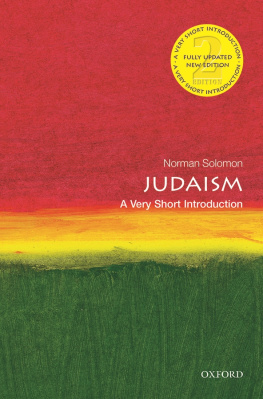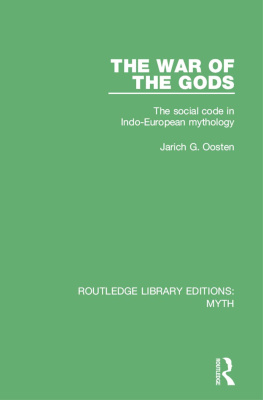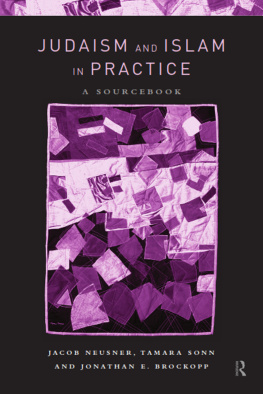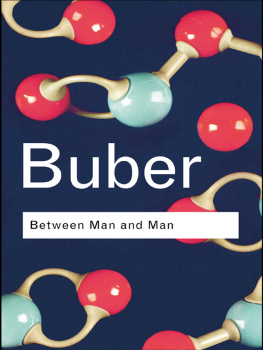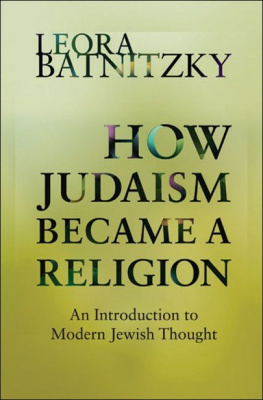Glatzer Nahum Norbert - On Judaism
Here you can read online Glatzer Nahum Norbert - On Judaism full text of the book (entire story) in english for free. Download pdf and epub, get meaning, cover and reviews about this ebook. City: New York, year: 2013, publisher: Knopf Doubleday Publishing Group;Schocken Books, genre: Religion. Description of the work, (preface) as well as reviews are available. Best literature library LitArk.com created for fans of good reading and offers a wide selection of genres:
Romance novel
Science fiction
Adventure
Detective
Science
History
Home and family
Prose
Art
Politics
Computer
Non-fiction
Religion
Business
Children
Humor
Choose a favorite category and find really read worthwhile books. Enjoy immersion in the world of imagination, feel the emotions of the characters or learn something new for yourself, make an fascinating discovery.

- Book:On Judaism
- Author:
- Publisher:Knopf Doubleday Publishing Group;Schocken Books
- Genre:
- Year:2013
- City:New York
- Rating:4 / 5
- Favourites:Add to favourites
- Your mark:
- 80
- 1
- 2
- 3
- 4
- 5
On Judaism: summary, description and annotation
We offer to read an annotation, description, summary or preface (depends on what the author of the book "On Judaism" wrote himself). If you haven't found the necessary information about the book — write in the comments, we will try to find it.
On Judaism — read online for free the complete book (whole text) full work
Below is the text of the book, divided by pages. System saving the place of the last page read, allows you to conveniently read the book "On Judaism" online for free, without having to search again every time where you left off. Put a bookmark, and you can go to the page where you finished reading at any time.
Font size:
Interval:
Bookmark:
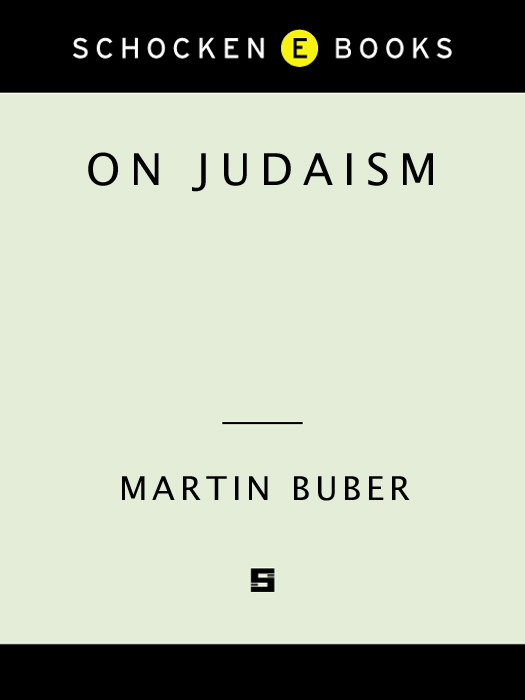
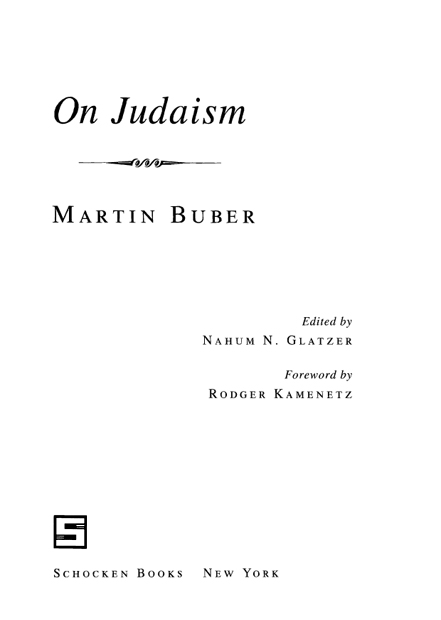
C OPYRIGHT 1967 BY S CHOCKEN B OOKS I NC .
Foreword copyright 1995 by Rodger Kamenetz
All rights reserved under International and Pan-American
Copyright Conventions. Published in the United States by
Schocken Books Inc., New York. Distributed by Pantheon Books,
a division of Random House, Inc., New York.
The Early Addresses translated by Eva Jospe
Library of Congress Cataloging-in-Publication Data
Buber, Martin, 18781965.
On Judaism / Martin Buber; edited by Nahum N. Glatzer;
foreword by Rodger Kamenetz.
p. cm.
Includes bibliographical references.
eISBN: 978-0-307-83408-9
1. Judaism. 2. Judaism20th century.
I. Glatzer, Nahum Norbert, 1903 . II. Title.
BM45.B814 1996
296-dc20 95-31333
v3.1

Contents

Foreword
I N EARLY twentieth-century Europe, the received opinion among Western-educated Jewish intellectuals was that Kabbalah and Hasidism were stuff and nonsense. Part of their prejudice had to do with social discriminationthe assimilated Jews of Berlin and Prague were embarrassed by their brethren to the East, the so-called ostjuden, with their long beards, fur shtreimls, and fanatical devotion to prayer, God, and snuff. They were also influenced by the movement in Germany for a scientific Judaism, with its emphasis on rationality and horror at anything that smacked of superstition, such as magic, amulets, exorcisms, demons and dybbuks, and other lore of Jewish folk. To such a sensibility, the notion that an extremely powerful tradition of Judaism ever flourished in the shtetls of the Pale would have seemed utterly unlikely.
One great thinker changed that perception. In his mid-twenties Martin Buber discovered the power of Hasidism, and thanks to his translations of its tales and legends, so did the rest of the German-speaking Jewish world. Although in some respects an heir to the scientific study of Judaism that preceded him, Buber had a strong taste for the mystical and he opened up for his audience of Jewish intellectuals the enduring significance to Judaism of its esoteric traditions.
As a consequence, when the first of his addresses on Judaism was delivered in 1909, Martin Buber at thirty-one was already an influential figure in the German-speaking Jewish world. Hed first risen to prominence from his student days as an activist in Theodore Herzls Zionist movement. Now, after several years of isolation during which he produced his first versions of Hasidic tales, he turned once again to the public arena to offer his audience the great hope of a Judaism they could believe in.
The early speeches collected here represent, then, a third major phase of Bubers careerhis mission to young Jewish intellectuals and artists before and during World War I. The first three speeches were given at the invitation of the Bar Kochbans, a society founded at Prague University in 1898, which proved to be the most influential Zionist organization in Central Europe. Others were given to a similar group in Berlin.
Franz Kafka, who attended at least two of these lectures, captured in his stories the anxious social and psychological state of Bubers listeners. Highly secularized and skeptical, deeply assimilated into German culture, they were also guilty and uncertain about their relation to Jewishness. They understood Judaism as bondage to paternal authority and as a system of archaic laws. Like Josef K. in The Trial, they could neither live within the inherited system nor be wholly free of its emotional claims. Many looked to Zionism for answers, among them Kafkas close friends, the philosopher Hugo Bergmann and the writer Max Brod. But in the years since Buber had first been active, the movement was losing its appeal, bogging down in purely pragmatic considerations. At just this point Buber was asked to give the first of his lectures. He offered up a truly liberating vision of a Jewish renewal, combining Zionism with the highest spiritual aspirations.
Gershom Scholem, the great scholar of Jewish mysticism, reflects back on those timeshis teenage yearsin an essay written shortly after Bubers death in 1965. When I came to know him, Scholem writes, he stood at the zenith of his influence on Jewish youth in German-speaking circles, during the years of World War I and shortly thereafter, when his words reached and moved a large audience. Though sharply repudiating many of Bubers ideas, Scholem felt that the Addresses on Judaism exuded a considerable magic in their time. I would be unable to mention any other book about Judaism of these years, which even came close to having such an effect among a youth that here heard the summons to a new departure that many of them took seriously enough to act on it. (Martin Bubers Conception of Judaism in On Jews and Judaism in Crisis, p. 138.)
The early addresses could be read as Zionist history, then. Or as a preamble to Bubers philosophy of encounter, especially The Holy Way (1918) and Herut: On Youth and Religion. (1919) By 1916, Buber had already started work on his philosophical masterwork, I and Thou.
But it would be untrue to their spirit to read them only in the past tense. They must also be read in the present indicative, as a response to the urgent needs of Jews today.
While very much in the spirit of Buber, such an assertion is also excruciatingly ironic. Momentous history separates us from his original audience: two world wars and the rise of Nazism. When one adds the destruction of one-third of the Jewish people in the Holocaust, then the irony grows deeper, and more powerfully somber. These addresses cannot be read without a sense of foreboding, reflected by Buber as well in the dedication of The Holy Way to his close friend Gustav Landauer, a Jewish socialist pacifist brutally kicked to death by soldiers of the German Reich in the postwar chaos of 1919.
But one more event separates us from the original audience for the early addresses. That is the unimaginable success of the Zionist project to which Buber contributed so much energy. From the start, Buber foresaw Jewish renewal emerging from the life of a genuine community of Jews on Jewish soil. So it is also ironic that his words might now have a special significance for North American Jews today, who remain stubbornly in Diaspora unmoved by the promise of the promised land.
Nevertheless, I would like to claim Buber as a prophet of our contemporary Jewish renewal, and not only because he uses the phrase explicitly in his third lecture. In addressing the spiritual situation of highly assimilated, secular, well-educated young Jews of his time and place, he spokein essential termsto the situation of most North American Jews today.
Essence is Bubers manner and modeboth the beauty and trouble of his work. His language mixes idealistic philosophy and romantic poetry into passages of great rhetorical skill, as well as infuriating imprecision. One can see why such a fiercely adamant literary sensibility as Kafkas was resistant to Bubers prose, but Kafka may have been more deeply influenced in literary terms than he would admit. The intensely symbolic realms of Kafkas tales trace their deed of origin to the even more elaborately symbolic tales of Rabbi Nachman, which Kafka read in Bubers translation. But when we consider that at the end of his brief life, the greatest practitioner of modern German prose was studying Hebrew so as to emigrate to Palestinethen we know Kafkas own life was a parable of the Jewish predicament Buber so deeply understood.
Font size:
Interval:
Bookmark:
Similar books «On Judaism»
Look at similar books to On Judaism. We have selected literature similar in name and meaning in the hope of providing readers with more options to find new, interesting, not yet read works.
Discussion, reviews of the book On Judaism and just readers' own opinions. Leave your comments, write what you think about the work, its meaning or the main characters. Specify what exactly you liked and what you didn't like, and why you think so.

